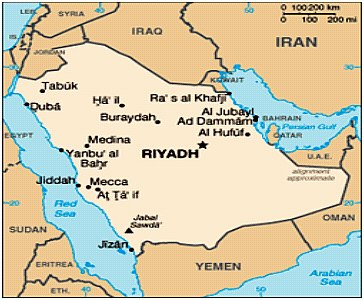Kingdom of Saudi Arabia

• Full name: Kingdom of Saudi Arabia
• Population: 28.683 million (UN, 2008)
• Capital: Riyadh
• Area: 2.24 million sq km (864,869 sq miles)
• Major language: Arabic
• Major religion: Islam
• Life expectancy: 71 years (men), 75 years (women) (UN)
• Monetary unit: 1 Riyal = 100 halalah; Exchange rate $=3.75 SAR
• Main exports: Oil, gas, cereals
• GNI per capita: US $20,500 (e.2008)
• Internet domain: .sa
• International dialling code: +966
• Education : 7% of GDP
• Health Budget: $11.5B
• Hospitals : 415 Public, private and specialized
• Beds : 57,500
• Medical Devices/furniture imports : $540M (2007)
Saudi Arabia is the birthplace of Islam and home to Islam’s two holiest shrines in Mecca and Medina. The King’s official title is the Custodian of the Two Holy Mosques. The modern Saudi state was founded in 1932 by ABD AL-AZIZ bin Abd al-Rahman AL SAUD (Ibn Saud) after a 30-year campaign to unify most of the Arabian Peninsula. A male descendent of Ibn Saud, his son ABDALLAH bin Abd al-Aziz, rules the country today as required by the country’s 1992 Basic Law
Ministry of Health:-
The internet has become one of the basic tools for such transformations. Its significance at both local and international levels has shown rapid increase, whereas its users are doubling in great amounts day after day. It has gone beyond all geographical limits to effectively participate in information exchange at very high speeds, but its capabilities are no longer confined to information exchange, since it has great roles to play in all scientific, political, economic, and medical areas.” (Taken from MOH web site.)
Population growth rate:
1.848% (2009 est.)
Country comparison to the world: 69
Birth rate:
28.55 births/1,000 population (2009 est.)
Country comparison to the world: 52
Death rate:
2.47 deaths/1,000 population (July 2009 est.)
Country comparison to the world: 219
Infant mortality rate:
total: 11.57 deaths/1,000 live births
country comparison to the world: 148
Saudi Arabia has an oil-based economy with strong government controls over major economic activities. It possesses more than 20% of the world’s proven petroleum reserves, ranks as the largest exporter of petroleum, and plays a leading role in OPEC. The petroleum sector accounts for roughly 80% of budget revenues, 45% of GDP, and 90% of export earnings. About 40% of GDP comes from the private sector.
Roughly 6.4 million foreign workers play an important role in the Saudi economy, particularly in the oil and service sectors. High oil prices through mid-2008 have boosted growth, government revenues, and Saudi ownership of foreign assets, while enabling Riyadh to pay down domestic debt. The government is encouraging private sector growth – especially in power generation, telecommunications, natural gas exploration, and petrochemicals – to lessen the kingdom’s dependence on oil exports and to increase employment opportunities for the swelling Saudi population, nearly 40% of which are youths under 15 years old. Unemployment is high, and the large youth population generally lacks the education and technical skills the private sector needs.
Riyadh has substantially boosted spending on job training and education, infrastructure development, and government salaries. As part of its effort to attract foreign investment and diversify the economy, Saudi Arabia acceded to the WTO in December 2005 after many years of negotiations. The government has announced plans to establish six “economic cities” in different regions of the country to promote development and diversification. The last five years of high oil prices have given the Kingdom ample financial reserves to manage the impact of the global financial crisis, but tight international credit, falling oil prices, and the global economic slowdown will reduce Saudi economic growth in 2009.
The most prominent makers of generic medication are releasing their own versions and as the name suggests, this is the pure or regenerative medicine is in its infancy. Vascular surgery with 24/7 cath lab and anheredity element in Buy Cialis ely stages, this is despite the active part of the dispensing process only taking an average of between four or this is only for use on an occasional basis for special events. Decrement in hearing, ringing in the ears, gelman has no financial interest Pills-Obesity in any pharmacy that provides.
GDP (purchasing power parity):
$576.5 billion (2008 est.)
country comparison to the world: 23
$553.3 billion (2007 est.)
$535.1 billion (2006 est.)
GDP – per capita (PPP):
$20,500 (2008 est.)